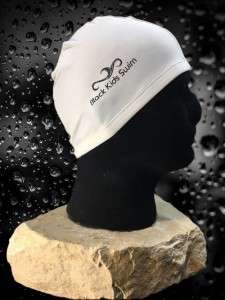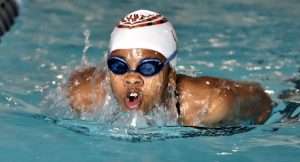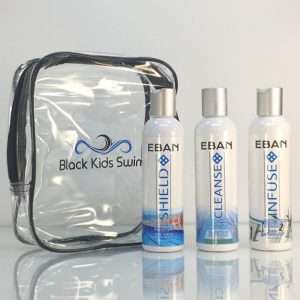
Natural Hair: Why Swim Caps are Necessary for Black Swimmers
“You’re leaving the house with your hair like that?” “You’re not going to be able to get a job with your hair like that.” “Can I touch your hair?” “Is your hair real?”
These are just a few of the many questions and comments imposed on Black people about their natural hair. Locs, twists, braids, kinks, and curls are representative of the Black diaspora. But, there are still people in the mainstream that continue to view Black people’s hair with disdain.
According to a study released by the CROWN coalition, Black women are 1.5 times more likely to be escorted out of the workplace because of their hair, and 80% believe they must change their hairstyle to fit in at the office.
Unfortunately, these negative sentiments created long-term adverse effects in many spaces, including the competitive swimming scene.
The Fight Against Natural Hair Discrimination
CROWN, which stands for “Creating a Respectful and Open World for Natural Hair,” stands at the forefront of combatting hair discrimination. The organization created the CROWN Act in 2019, which bars the discrimination of natural and protective hairstyles in employment and education. Since then, they have extended this mandate to the swimming world.
Black Kids Swim joined the CROWN Coalition, along with the National Urban League and Dove, to advocate for the needs and protection of Black swimmers and the natural hair community.
This support comes on the heels of the International Swimming Federation’s (FINA) decision to ban the use of the Soul Cap at the Olympic Games. FINA claimed the cap did not follow “the natural form of the head” and gives certain swimmers an unfair advantage. After widespread criticism and backlash, they issued an apology stating their support for Soul Cap and similar brands for future events.
The Black swimming community is using this situation to address hair concerns and improve the relationship between Black swimmers and the competitive swimming profession.
“As the world’s #1 resource for Black competitive swimmers, Black Kids Swim is committed to increasing Black participation in competitive swimming. The talented young Black swimmers we work with every day are the future of swimming, and many of them have natural hair,” said BKS founder Ebony Rosemond.
“Competitive caps that take natural Afro hair into consideration are already needed and in use,” Rosemond added. “BKS applauds Soul Cap, Swimma Caps, Black Girls Swim, and the many brands who recognized this need and, years ago, sent a much-needed positive message of inclusion to our young swimmers.” Black Kids Swim is one of the organizations leading the charge in providing more representation for Black people and natural hair in competitive swimming.
Leading by Example
The primary goal of the CROWN movement is to influence government officials into “adopting policies to ensure full, equitable participation in the sport of swimming.” This effort includes accepting swim accessories and products that are beneficial to Black swimmers, with the overall message of creating a healthy environment for them to thrive.
Black Kids Swim offers a safe space for Black swimmers and their natural hair, proving why our involvement in the campaign to dismantle hair discrimination in swimming helps propel the movement further.

Use the Black Kids Swim EBAN cap as part of the SOAK, COAT, COVER™ method.
Our popular EBAN haircare line is an essential product for swimmers to protect against chlorine damage and keep hair healthy, moisturized, and manageable. The EBAN Lycra Swim cap prevents the loss of hair edges and the Warrior Swim cap celebrates the long tradition of swimming in the African diaspora.

Warrior Swim Cap
Black Kids Swim appreciates the contributions of Black competitive swimmers to the sport. Diversity is our strength, and fostering an inclusive space for our swimmers is the best way for the swimming world to grow and prosper.
To learn more about our participation in the CROWN Coalition and the latest efforts of the campaign, visit their website for more information. Use hashtags #TheCROWNAct and #PassTheCROWN to promote this important effort, and we’ll be one step closer to making natural hair discrimination an issue of the past.




